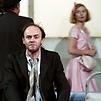: Concerning the play
Présentation : By the director
"If a madman rises up like a demigod, his madness is at least substantial, but to believe one is an insect and to crawl proudly in the grass, is, to my liking, the height of absurdity".
J.J. Rousseau - letter 4 - Pléiade p. 1100
"The look is always virtually mad: it is at the same time, the effect of truth and of madness.
Whoever looks you straight in the eyes is mad".
R. Barthes - La chambre claire p. 175
"I am not mad, my brother - he is not mad who finds a system which saves - he is cunning like a hungry animal."
A. Baricco - Novecento pianiste
A handful of men accompanied by a woman, withdrawn into themselves in an asylum in distress, excluded as if naturally from the world of humanity, turn desperately towards heaven from their unfathomable Balkans. Heaven - the paradise symbolised for them by Western Europe - can perform chance miracles: it befalls to them to receive a parachuted parcel which is hardly destined for them.
"Le Colonel-oiseau", by the Bulgarian playwright Hristo Boytchev, refers to the fabulous and seriously current metaphor of our historic present, that is the ultimate face to face between a small community which has reconstituted itself in an insecure dignity, and Strasbourg, the heart of political Europe, the terminus of their journey. Does the fable tell us if this improvised delegation - between humour and anxiety - will be heard? Perhaps it is still waiting?
For Didier Bezace, the theatre is the art of the question. This is why he remains faithful to his work of discovering contemporary playwrights, while paying attention to the theatre of both the individual and the chorus. Didier Bezace deliberately chooses to reflect to the spectator the act of aesthetic resistance of a theatre of politics and poetry.
The stage director Didier Bezace's choice of the play Le Colonel-oiseau by Bulgarian Hristo Boytchev, is based on a chance reading by a director of the Centre Dramatique National who received the script at the Théâtre de la Commune d'Aubervilliers, recommended by a little note attached by the translator Iana-Maria Dontcheva. The preference given to the play is also linked to the work done over the previous two years by Didier Bezace and his team for the opening at the Festival of Avignon of Pereira prétend, based on A. Tabucchi, in 1997, the culmination of a trilogy including in addition, La Noce chez les petits-bourgeois and Grand'peur et misère du IIIè Reich by B. Brecht, and Le Piège by E. Bove.
Le Colonel-oiseau belongs to this theme of man and History, and alludes to what is happening today in Eastern Europe. The play deals with Utopia and with the situation of people before their own history. Written in 1995, it cannot avoid the events of the time affecting Sarajevo. The script also describes the situation of neglect, of destitution felt by the people of Eastern Europe in general, and Bulgarians in particular. The director cannot help admiring the capacity for invention disposed of by these human beings to try to pick themselves up again, facing up to themselves and to us.
Le Colonel-oiseau has the appearance of a fable, a metaphor, which could also have madness as a theme, since the small group of individuals who make up the action, is in reality locked up in the annexe of an asylum, and whom a doctor has come to see in order to fulfil his mission. In the end, the latter rallies to their cause. The annexe of the asylum symbolises Bulgaria, stuck between Serbia and Turkey: this small country has been forgotten, and the Bulgarians who are familiar with Boytchev's play -as Didier Bezace retells - report within themselves a sort of madness, a madness of destitution, a madness of worry and anxiety, a craving to be heard.
Europe, a Europe of differences, represents for the director a urge for exchanges on common ground thanks to passerelles - linkways - that is, writers. Already, Pereira prétend brought to light a hesitation between rebirth of the person and renunciation of the self, realities and questionings that can be shared in Europe like equity capital.
in programme of the festival of Avignon 1999
Ces fonctionnalités sont réservées aux abonnés
Déjà abonné,
Je me connecte
–
Voir un exemple
–
Je m'abonne
Ces documents sont à votre disposition pour un usage privé.
Si vous souhaitez utiliser des contenus, vous devez prendre contact avec la structure ou l'auteur qui a mis à disposition le document pour en vérifier les conditions d'utilisation.


